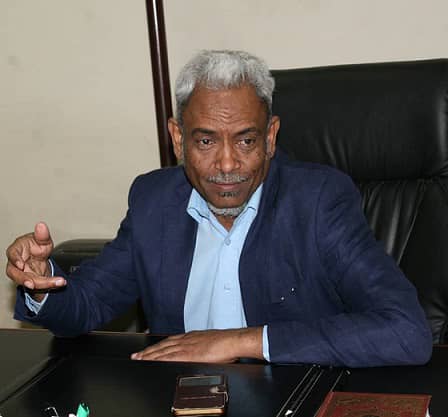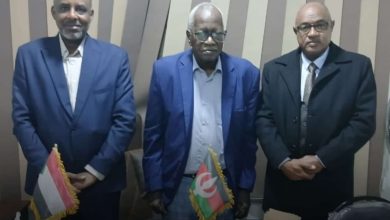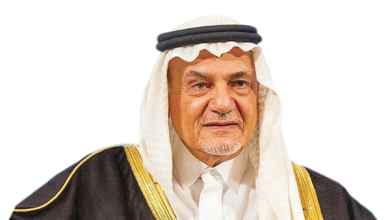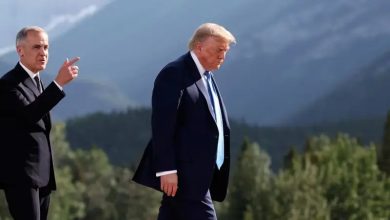Advisor to Ex-President: This is a Political War Fueled by Regional Alliances

Agencies – Sudan Events
The advisor to the former Sudanese President, Amin Hassan Omer, said that the current conflict in his country “is due to external intervention with the aim of re-shaping Sudan politically, and these external interveners will only accept the result that comes close to the image they wanted of the final scene in Sudan,” and in a way that suits these external parties.
Omer – who served as Chief Negotiator for the Sudanese government in the Darfur Doha Peace Talks (2009-2011) – added that “the current Sudanese scene is part of the general scene in the region, and it is a scene based on dividing and fragmenting the region and pushing it to accept normalization with Israel, and that it will be one of the vehicles pulled by the Israeli locomotive towards the west.”
The former minister stressed – in an exclulsive interview with Al Jazeera Net – that what was happening in Sudan was not a civil war between Sudanese tribes and clans, but rather a political war, with regional alignment behind it, and “the declared goal is to dismantle the army and target basic political forces in the Sudanese scene and remove them permanently, not only of all political rights, but, even of natural human rights.”
Amin Hassan Omer received his university education at the University of Khartoum, and obtained his master’s and doctorate degrees in the United States. He wrote several books, including: “The Genesis of Politics”, “Conflict of Secularism and Islam in the Middle East”, “The Origins of Islamic Thought”, “The Origins of Sudanese Culture”, and “The School of Committed Islamic Literature”. He also has produced two poetry collections entitled “Ashgan Al-Tawhid” and “Muhammadiyat”.
Hereuner are excerpts from the text of the interview:
What is the nature of the crisis in Sudan? Who is responsible for the outcome of the current conflict?
– The problem with the prevailing narrative in the media and in diplomacy in general is that of the two sides led by two generals fighting, and this narrative is not true, because even if an agreement is reached between these two generals, the problem will not go away, because the issue is not personal, centered around them. The issue is basically external intervention aimed to re-shape Sudan politically, and these external interveners will only accept the result that is close to the image they want of the final scene in Sudan. Therefore, it was a mistake to focus on the personal players, because individuals do not enjoy all that importance, at least on the side of the army. General Abdul Fattah Al-Burhan cannot take a decision regarding the army or the country without broad approval by the armed forces, which are clearly aware of what is intended. The first thing that is wanted is to dismantle this army – and this has been made public- and rebuild it in a way that suits external parties, and this cannot be allowed to happened. Therefore, a political settlement cannot occur through paralleling the two parties, because there is one nationalist team that wants to preserve the dignity of the homeland and its national independence, and the mercenary militia that brings soldiers from abroad, funding from abroad, and arming from abroad, who must be defeated. Nobody can accept a settlement with any external interventionist tendency.
But if the reality is a disagreement, as was happening between us in the past with the armed movements, then this is an internal disagreement. It is true that there were external parties with agendas in it, but the scene was not managed according to what they had wanted it. It was only choosing one of the two groups and supporting it, but now they have created one of the two groups, and they use it to redraw the scene in a way that achieves their interests in Sudan.
In fact, the scene of Sudan is part of the general scene in the region. It is a scene based on dividing and fragmenting the region and making it accept normalization with Israel, and to be one of the vehicles pulled by the Israeli locomotive towards the West.
Does this mean that the regional alignment behind the two teams is behind the continuation of the conflict in Sudan until now?
– This change was intended to be very easy: as coup takes place and there is a political incubator ready for it, and there is a regional incubator ready as well, and there is international acceptance, because the international Quartet was satisfied that if there was a smooth change in Sudan towards the so-called Framework Agreement, then there would be no problem. This did not happen.
What happened was that there was a party that viewed this situation as a crucial issue. The declared goal was to dismantle the army, target key political forces in the Sudanese scene, and completely remove them not only from all political rights, but also from natural human rights.
I am a politician who have worked in politics since the time of former Sudanese President Jaafar Numeiri. I was arrested during his era. I was an opponent and then reconciled. I was arrested after that during the last regime more than once. No one can tell me enough is enough and that am now outside the political process. And not only me, but the political scene and the whole political trend, particularly if you want to replace the strong with weak ones, the patriots with agents with patriots, no one will ever accept this.
Will the change of one of the two leaderships accelerate the end of the conflict and usher in political understandings?
– I do not think so, because the main intervention is external intervention, and it will only allow people with loyalty to the same centers of power to change leaders. Therefore, the change will not have a significant impact, except by changing some traits related to the personality, which will not change the scene. Mohamed Hamdan Dagalo (Hemedti) himself was absent from the scene for several months. Has the scene changed? No, it has not changed because it is managed from the outside, and therefore his appearance or disappearance will not have much impact on the scene, and for a long time the Janjaweed mercenaries who came from abroad did not really know whether he was alive or dead, and they did not know exactly who was leading this war, and every group was watching its direct leadership, so changing leadership has little effect, and will never change the scene.
But the Rapid Support Forces (RSF) were finally able to control multiple areas and exercise authority in them, alone?
– First, we must define what is meant by the word “control.” The mere entry of forces into a civilian city that does not have military garrisons cannot be said to be control. Did the RSF control the military garrisons and turned itself into a ruling force in this region? Or are they just cars that come to plunder and then leave?
Civilians have fled, so will the state guard the empty homes after their people have abandoned them, because they are being plundered, looted, murdered and raped? Does the state govern empty homes? Also, 80 to 90% of the military garrisons are under the control of the army everywhere, with the exception of some limited peripheral cities. Then, when they entered the city of Medani, they entered with betrayal from the existing authority, including the army forces, which withdrew without a fight, and this does not make it control at all.
Control militarily means controlling the garrisons, establishing outposts with which to control the situation, and impose authority in this place. All of this is not available to these Janjaweed, neither in Khartoum, nor in Medani, nor anywhere. They only occupy some people’s homes, as happened now in Khartoum, but where are the residents? Where is the state? Where is the authority? How will you establish authority over people who are absent from their homes?
Military control is known, and political control is something else, which is to have the presence of a ruler in the area you control, so using the word “control” is not accurate, and if they control Khartoum, why didn’t they declare a government that exercises authority, and manages all civil affairs? If you want to rule people, is it possible to destroy universities and stop electricity and water? Why do you plunder industrial areas? Why do you burn? Are you fighting the state or are you fighting citizens and businessmen? Or do you fight public services such as electricity and water? We hear all this and we are surprised when it is said that this militia controls Khartoum! What concept of control is this?
Has the Sudan cohesion and societal fabric changed in light of this fighting and did matters reach civil war?
– This narrative is also completely wrong, as a civil war must be a war between tribes, clans or groups so that it can be called a civil war, but what is happening in Sudan now is a political war. If we look at the different tribes, we will find groups of them in this camp and other groups in the other camp, and some tribes may have a greater inclination here or there, and the importance here is not in the number of people, because the majority of people are not involved in this war, and this is what makes it a political war, because it was created to enable political-military parties to control the scene for the benefit of the parties that finance and sponsor this change.
In conditions of turmoil and strife, people may have such thoughts, and this may have some immediate effects that will not last long, but I do not believe that the social fabric will be affected by all of this, or that there is a fundamental crisis among the people in Sudan.
There is a difference between the political discourse of some intellectuals and elites who use statements with rhetorical political approaches in order to maximize their political gains, and the reality on the ground.
I have no fear either of civil war or of tribal misunderstanding. It is true that this setback will have social effects, but it will only be for some time, and it will not be a reaction to the state of consensus among the Sudanese, who always tend toward cohesion.
Now Sudanese cohesion is a message to the whole world. Have you seen a refugee camp or a displaced persons camp? All the people went to their families who sponsored them, whether inside or outside Sudan. Each expatriate in his place sponsored his family, and sometimes he sponsored more than one family. Inside, one house now hosts 5 to 6 families living in the same place where one family used to live.
The Sudanese people are nowadays cornered economically, security-wise, and they lack even the simplest necessities of life. What can people do in such circumstances?
– This is the tragedy of war, and if you are waiting for an answer from me, I do not have an answer. War always kills the weak but if the solution is to allow someone to control your country and veer its interests and financial resources towards the outside , as well as its agricultural lands, then no one will ever accept this.
Now the matter has gone beyond targeting public interests and state capabilities to targeting the personal capabilities of individual citizens; cars are looted, as are money and gold, and the matter has reached the point where mercenaries come in cars and loot furniture from homes. How can people be expected to accept a settlement after this? People will fight for their rights until they obtain them, or until they secure what remains of them to ensure that they will live a decent life in their country, because no one can feel a decent life outside their country.
Several human rights bodies accuse both parties and their supporters of committing violations against citizens. Is this monitored by legal means and then the perpetrators of these violations prosecuted before international courts?
First, the state established a commission for this, and there are many civil initiatives that were established to follow up these violations. As for the statements of politicians, foreigners, and debaters, they say that we accuse this and that for the sake of settlement, and there is no evidence for this.
Secondly, the problem with the militia is that it documents its crimes by itself, and on social media sites you will find all of that, and you will not need an outside party to document this, or say that it happened or not. These people are proud of their actions, photograph them, talk about them, and say, “These are our rights.”
Thirdly, most of these mercenaries are from outside Sudan, and do not have citizenship rights in Sudan, and Hemedti himself described them as “scavengers”, and this Sudanese word means “a mercenary who fights for the gain he will obtain.”
And if these were outlaws, then how many were the outlaws? One hundred, two hundred, 10,000? So what if the entire army was unruly, including its commanders!
How do you evaluate the Sudanese state’s efforts to end this conflict and stop the bloodshed and the state’s capabilities?
The state now has exerted efforts to stop the war, but it is weak due the weakness of the government, because the leaders of the weak government that caused all this so far have not been replaced for the most part, although some adjustments may occur.
But fortunately, there is a federal government in Sudan, and there are powers for the states, and therefore you will find that some states are better off and more cohesive, and the production process is proceeding in them as if in a normal state, and there are some states whose situation is more difficult due to weak leadership.
In my opinion, this government is incapable, and no one is taking action in it, and unfortunately those who lead it do not have the desire to amend this matter due to the connection with the outside world, and for fear of being told, “You relieved some people and brought in others who may have different political orientations,” so not giving consideration to the people’s necessary needs, is the problem at the moment.
You are a statesman, a former negotiator, and an active politician in the Sudanese scene. What is your “recipe” for getting out of the impasse that the Sudanese are currently experiencing?
– People must return to their homes and normal conditions, this is first, and this will not happen unless these mercenaries leave, even by force, and people have a normal life, and any agreement reached will only be theoretical and has no value.
The dilemma now is that these people have been released from their shells , so who can evict them out? Hemedti himself does not have strong authority over these people to get athem out of the villages they plunder, so how could this happen? This will only be done through force, because what was taken by force can only be regained by force. There is no second option.
The main mobilization at present is that the people themselves who felt danger to themselves and their property, and the weapon of mobilization and massive mobilization is what will decide the battle, at least at the level of removing these people from our homes and towns, and after that the problem with the government will turn into a political issue, as we had political issues in the past.
We remained in Doha negotiating with the rebels for 10 years, and we made agreements, signed them, and implemented many of them, and no one was entering people’s homes, looting them, or tarnish their honours. Such actions are not negotiable, because negotiation is over political issues, and not over your rights, property and honor.
I have no doubt that the Sudanese people will be victorious, and now the West itself is very cautious of this huge mobilization that is taking place, because if the people succeed in obtaining weapons and expelling those intruders, Sudan will change forever.



